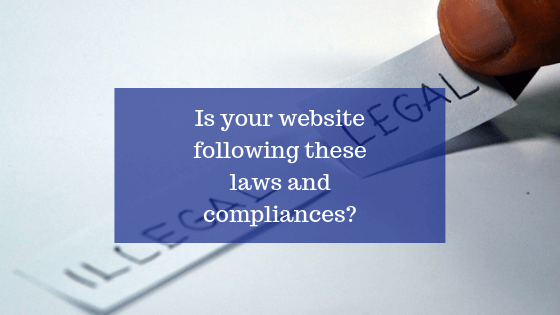
Is your website following these laws and compliances?
A start-up, a social media platform, an e-commerce brand or any major business enterprise, it all starts with an office, a website and a small group of dedicated employees. Yet, running a website is no easy feat, especially if your website is your core business model. It requires designing, formatting, good content and at the end of the line, legal compliance.
With more than 200 sovereign states in the world, jurisdiction in each has become a priority. Every Government has understood the latest trends of the online world and established laws for protection, security, and safety of online users.
Your website? It should be compliant with such legal requirements to avoid the high costs and pains of litigation. With more than 1.66 million digital buyers in 2016, your website is the hub of all your customer activity but can also be the source of all your problems.
Still curious about what laws and compliances we are talking about? Read ahead.
United States’ Americans with Disabilities Act (ADA)
Table of Contents
The law that has been existing in the U.S and is also a part of the world website legal governance called the World Wide Consortium, it is an accessibility guideline. It might seem a little complicated at first but if you follow the Web Content Accessibility Guidelines (WCAG), your website is safe. Your website will need to be accessible and usable by every single user, equally.
This means you would need to make provisions covering website use by any person with disabilities. The law doesn’t mention websites officially, which doesn’t make legal compliance mandatory but it is better to be safe than sorry. The ADA has been garnering value over time, with 80 million and 56.7 million people struggling with disabilities in the European Union and the US. So, ensure that you check the WCAG 2.0 AA level standards and comply with them.
Data Protection Act and the GDPR regulations
Personal Data which is collected by websites needs to be transparent and informed. Basically, you’ll need to inform users about how you will use or handle their personal data while collecting it. This can mean a short notice or inscription while an account registration and a mandatory warning about the usage of cookies on your web page. You need to also make sure the website is safe, secure and uses data protection solutions for the benefit of your users. With the average cost of a malware attack on a company being $2.4 million, you would not want to be taking any cyber-security risks.
Copyright Act
The Copyright Act 1976 is a prime player for you to authorize and protect original content on your website. It can mean something like the website design by a graphic designer or a blog post or even a special product page. Make sure that your website is copyrighted during development and you file for registration of your entire website.
This way you have your compliance sorted in case of any legal suit filing. Also, it gives you control over your content and rights for granting permission for any re-use or public distribution of the same. You could also look at licensing and patents for further legal safety. However, there is a catch, after registration, if you add any new materials or upgrades to your online platform, you will have to file for registration again.
All said and done, your website is like your company’s child, growing and learning along the way. To avoid any errors or litigation issues, you could always use website archiving tools like Stillio which capture, store and save your website’s content and activities for you in case a lawsuit arises and you require evidence. This way you can also keep a check on what goes on, what is displayed and whether or not your website needs any changes for compliance. Moreover, it mandates data protection and ensures any personal data is adequately saved for use by your company.
So, the three things that must be done for a website’s legal compliance?
Starting a website? Protect it.
Running a website? Check ADA standards.
Upgrading a website? Copyright it.











